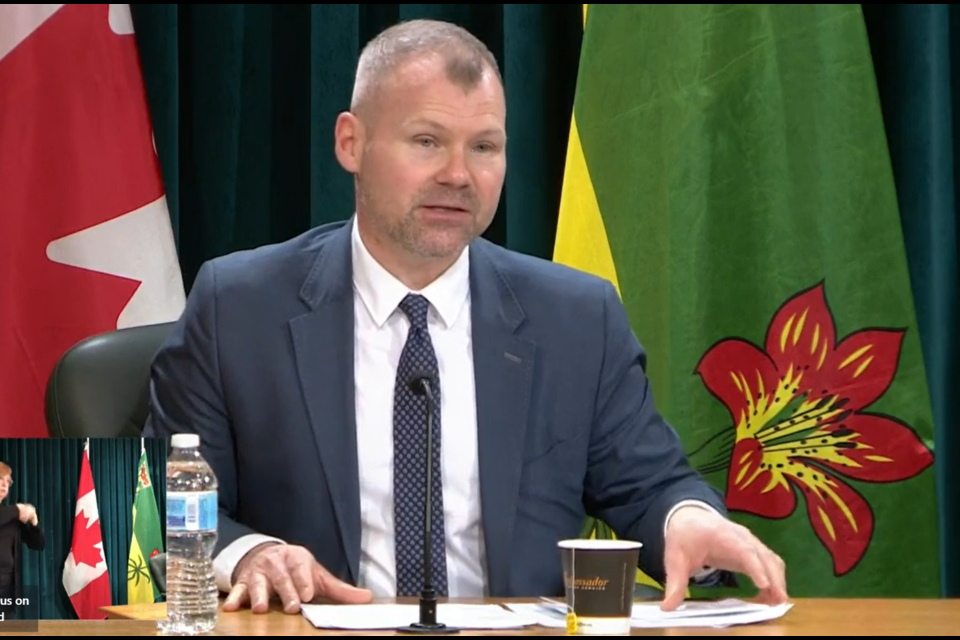REGINA — With schools across Saskatchewan returning to classrooms earlier this week, the province has announced that the plan to monitor COVID-19 spread in schools is asking parents to pick up on at-home rapid antigen testing.
During a press conference on Jan. 5, Education Minister Dustin Duncan outlined the protocols for positive COVID-19 test reporting and isolating, which rely almost solely on individuals self-reporting their rapid test results to schools themselves.
“Schools have done a phenomenal job of maintaining in-class learning and that work will continue in the New Year as we all learn to live with COVID in our daily lives,” said Duncan.
This self-reporting applies to both school-based staff and students, said Duncan, with responsibility for rapid testing now placed on parents or guardians at home.
The self-reporting protocol follows the province’s announcement last week that positive rapid test results will no longer require a confirmatory PCR test from the provincial laboratory.
School officials will notify classrooms, bus cohorts and parents or guardians of reported positive cases, to identify potential contact. It will also fall to schools to alert public health officers if any outbreaks — three or more cases linked to one classroom or cohort — occur in facilities.
Positive cases reported in schools will still be shared publicly through the Saskatchewan Health Authority, said Duncan, although specifics on that process are still in development.
“It's on the honour system, and so it's going to be an incomplete number [of cases] but hopefully this will provide somewhat of a picture for parents who are interested to know what’s happening,” said Duncan.
Fully vaccinated close contacts in schools will be asked to self-monitor, and may continue to attend school or daycare and activities outside of schools if they are asymptomatic.
Isolation requirements will follow provincial guidelines, with fully vaccinated individuals asked to do so for five days and unvaccinated individuals for at least ten days.
For those identified as close contacts to non-household cases in schools, daycares or extra-curricular activities, continuing to attend classes will be allowed but extra-curriculars are off the table.
Duncan said the outlines offer a “clear advantage” to С����Ƶ vaccinated, as the isolation period for both staff and students and the limitations on other activities are both lesser than for the unvaccinated.
An additional 250,000 rapid tests have been allocated specifically to school divisions, said Duncan, to aid with these procedures, and the provincial interim education plan has been extended.
When asked why the ministry of education decided not to delay the start of schools, like most other provinces in the country, Duncan said the ministry felt that Saskatchewan was prepared to begin in-classroom learning “safely” with the utilization of rapid testing.
“We may have to change course, as we have all along, as classrooms and schools may need to pivot into a different direction,” said Duncan. “But we felt we were in a good position to start the post-winter holiday break with as many students in the classroom as possible.”
Duncan also said the ministry heard “little interest” expressed to delay the return to classrooms, but Saskatchewan Teachers Federation president Patrick Maze said that the organization submitted a request to the ministry last week to delay students’ return by two days.
Maze said the STF requested the extra time to assess staffing shortages and properly implement cohorting, for the safety of staff and students.
“Without cohorting, it is likely Omicron will spread in our schools,” said Maze, in a Facebook post. “By hastily rushing back, our government is actually threatening our ability to maintain in-person learning.”
Duncan said that the ministry denied the request because it felt a two day delay would not “provide a benefit.”
The Ministry of Education expects disruptions within classroom cohorts due to positive cases, said Duncan, but feels the current tools available to school divisions will be enough to aid those situations.
The Saskatchewan NDP also requested a delay for the start date last week, which was not answered by the ministry.
Opposition education critic Carla Beck critiqued the ministry’s announcement today, saying that both the Sask NDP and residents in the province were expecting a more prepared plan to be shared.
Beck said the guidelines on reporting and isolation will not be enough to keep students in classrooms if cases surge.
“A ‘wait and see’ strategy that risks [students’] safety will not accomplish that,” said Beck, in a written email statement. “The longer you wait and sit on your hands, the fewer options you leave for school divisions and parents.”



